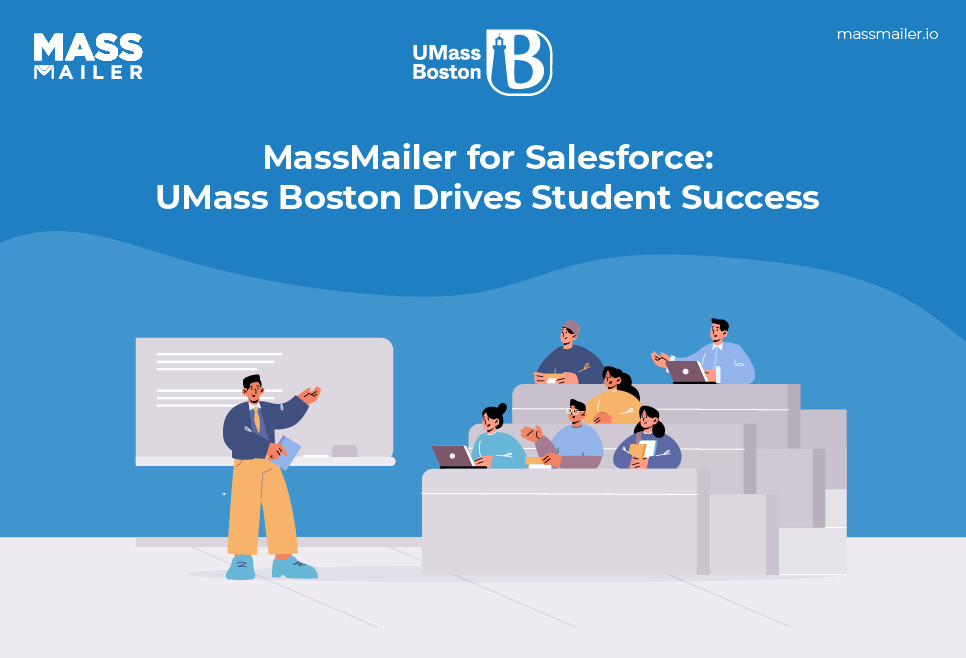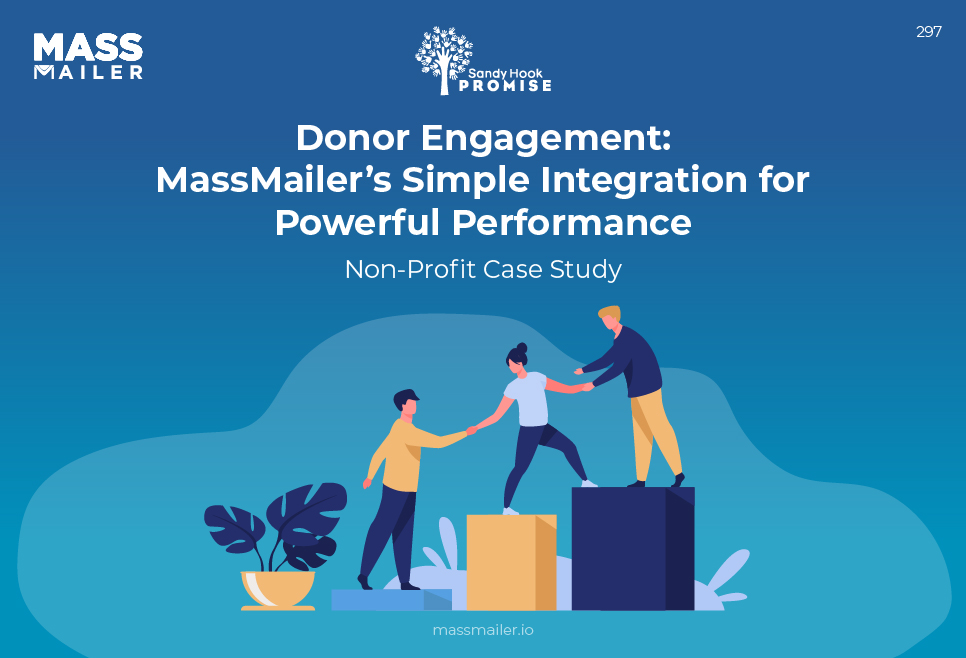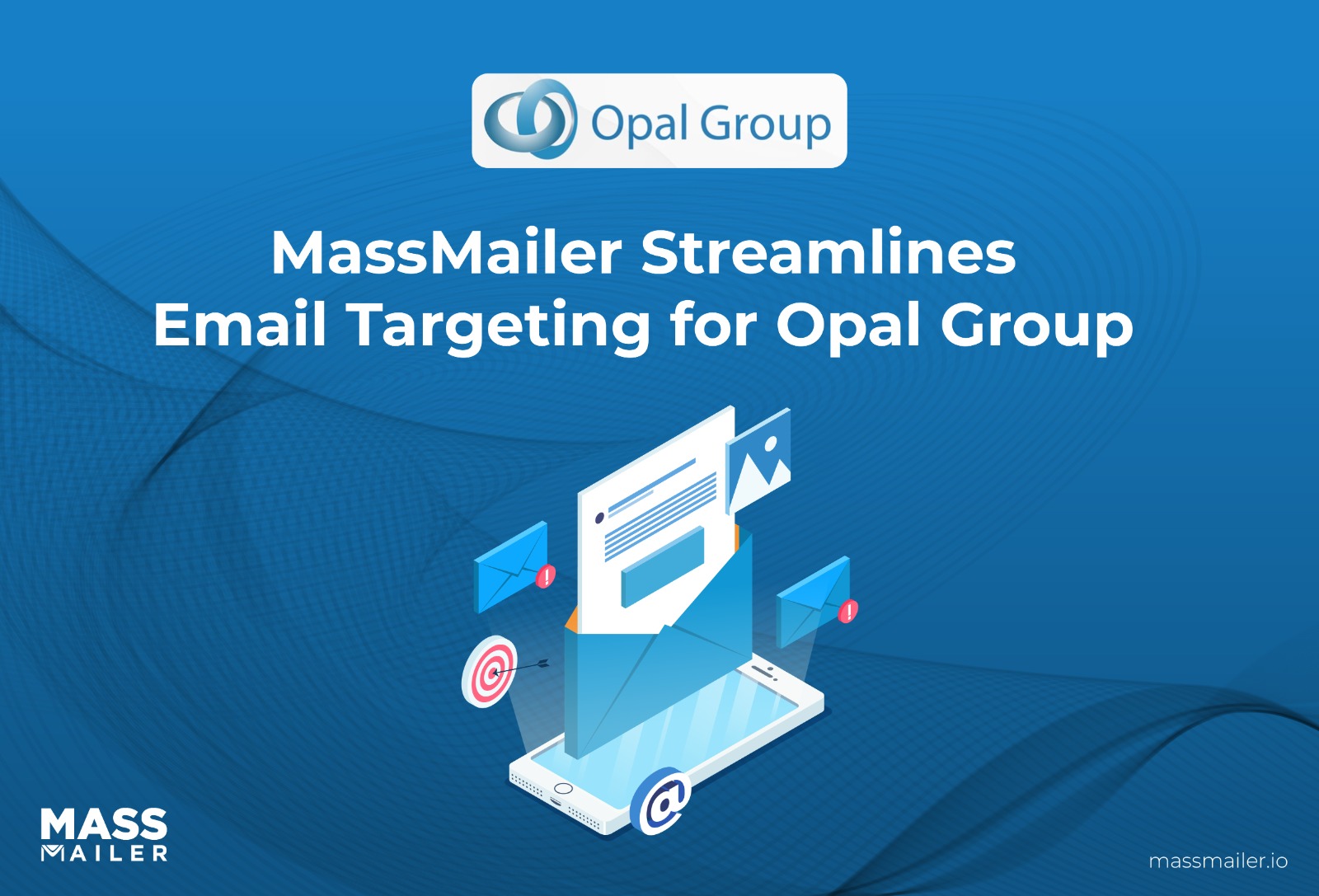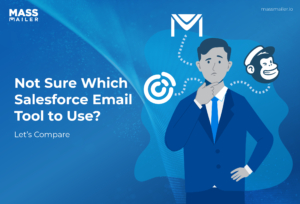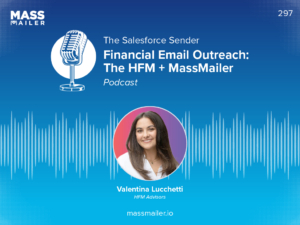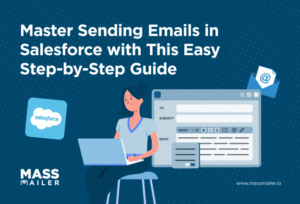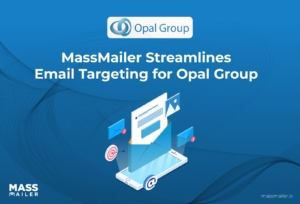Table of Contents
Introduction
A recent Forrester study found that companies using Salesforce Marketing Cloud saw a 299% return on investment in just three years. That’s a big number, and it shows how much impact the right marketing platform can make.
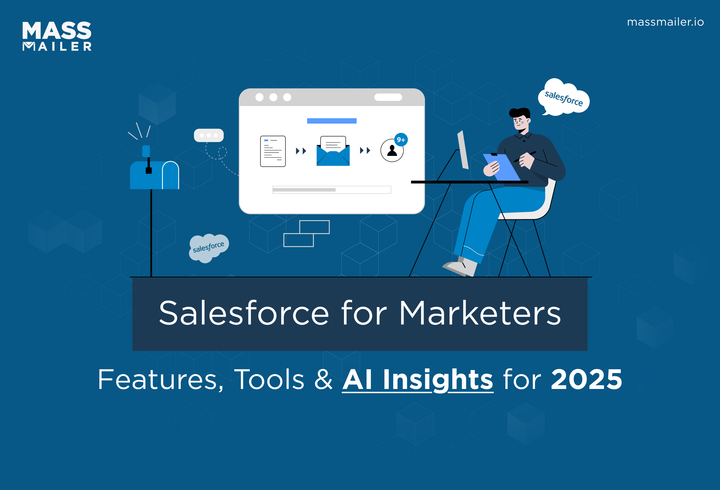
So, what makes Salesforce for marketers so powerful? It helps you bring everything together in one place. Your emails, ads, mobile messages, and analytics all work in sync. Instead of managing different tools, your team can focus on reaching people with the right message at the right time.
It also gives marketers smart tools for automation, personalization, and tracking results. That’s why so many teams are now looking into Salesforce for marketers' training. They want to learn how to use it fully and get more from every campaign.
In this guide, we’ll walk through how Salesforce for marketers works, why it’s so effective, and how you can start using it to grow your business.
What Is Salesforce for Marketers?
Salesforce for marketers is a powerful marketing platform that helps teams plan, automate, and measure campaigns all in one place. It’s built on Salesforce Marketing Cloud, which brings together email, mobile, ads, and analytics so you can deliver connected and personalized experiences.
Instead of switching between tools, you get a single dashboard where your team can see what’s working and adjust in real time. It gives you a complete view of every customer, from their first click to their latest purchase, so you can reach them with messages that truly fit their needs.
It also connects marketing with sales and service, helping everyone work from the same data and create smoother customer journeys. And when your team takes Salesforce for marketers training, you’ll learn how to use automation and AI to boost results and save time every day.
Why Salesforce for Marketers Is a Game Changer for Modern Marketing Teams
Salesforce for marketers changes how marketing teams work. It helps you bring everything into one place so your campaigns, data, and results all stay connected.
Today’s customers expect brands to know them and speak to them in a way that feels personal. With Salesforce, you can do just that. It helps you understand what your audience needs and reach them with messages that matter. Whether you’re sending an email, launching an ad, or following up on mobile, everything works together to create a smooth experience.
It also connects marketing with sales and service, so everyone shares the same customer information. This makes teamwork easier and follow-ups faster. When your teams are aligned, it’s simpler to build trust and long-term relationships.
That’s why Salesforce for marketers stands out as it turns everyday marketing into meaningful connections that drive real results.
What Salesforce Offers Marketers
Salesforce for marketers brings all your marketing tools, data, and teams together in one connected system. It helps you plan smarter campaigns, personalize customer experiences, and measure results that drive real business growth. And with tools like MassMailer, you can take Salesforce’s email and outreach capabilities even further.
Let’s look at how it supports modern marketing teams every day.
How Salesforce Empowers Marketing Teams
Salesforce for marketers helps teams work better together by connecting marketing, sales, and service through Customer 360, a single view of every customer. This shared view makes collaboration easier and helps everyone stay focused on the same goals.
Here’s how it empowers marketing teams:
- It gives every department access to the same real-time customer information, reducing confusion and improving decision-making.
- It allows marketers to trigger campaigns based on CRM updates, like lead status or deal stage, ensuring messages reach people at the right time.
- It helps teams set clear roles and permissions, keeping data secure while enabling smooth collaboration.
- It supports stronger alignment between marketing and sales, often leading to faster lead responses and higher conversion rates.
Salesforce Marketing Cloud Overview
To make all this work seamlessly, Salesforce Marketing Cloud offers a full suite of connected tools. It combines Email Studio, Journey Builder, Advertising Studio, and Mobile Studio so marketers can manage campaigns across every channel in one place.
Here’s what that means for your team:
- You can plan, build, and track campaigns for email, mobile, and ads from a single dashboard.
- The platform updates in real time as customers engage, helping you adjust content and timing instantly.
- It’s designed to grow with you, starting from simple email campaigns and expanding into complete, cross-channel journeys.
- Because everything runs on one platform, you don’t waste time switching between tools or re-uploading data.
- If you want more control over your email outreach, MassMailer makes it easy to send unlimited emails from Salesforce while staying compliant and tracking results in real time.
Key Features and Capabilities
Salesforce for marketers gives you flexible tools to understand your audience and deliver campaigns that connect. It’s built to help you reach the right people, personalize content, and track what’s working, all from one place.
Here’s what stands out:
- You can segment your audience based on behavior, interests, or lifecycle stage.
- Journey Builder helps you design step-by-step paths that change automatically based on what each person does next.
- Personalization tools make it easy to show the right message, image, or offer to each individual.
- Built-in dashboards let you track engagement and see how marketing activities drive leads, sales, and revenue.
- For email marketing, MassMailer, built natively on Salesforce, offers powerful bulk email features, templates, and delivery tracking, all within the CRM you already use.
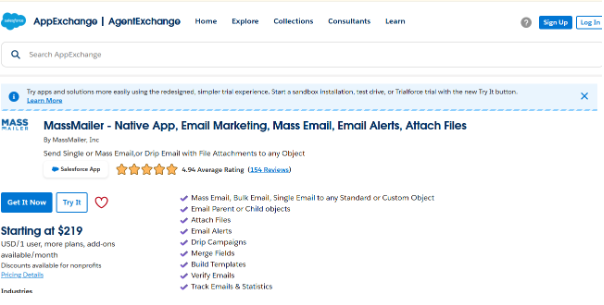
Together, these features make Salesforce Marketing Cloud a powerful system for building relationships and driving measurable growth.
How Salesforce Connects Sales, Service, and Marketing
One of the biggest strengths of Salesforce for marketers is how it connects marketing with sales and service. When every team works from the same system, it’s easier to create smooth customer experiences and respond quickly to new opportunities.
Here’s how it helps your business stay connected:
- Customer 360 links data across marketing, sales, and service, giving everyone a single, complete view of the customer.
- Marketing can trigger campaigns when a lead moves forward or when a service ticket is closed.
- Shared data allows teams to measure which marketing efforts lead to conversions, renewals, or repeat purchases.
- Breaking down silos helps improve customer lifetime value and builds trust across every stage of the journey.
- With MassMailer, marketers can send timely, personalized emails that align perfectly with sales and service updates, keeping every customer touchpoint in sync.
By bringing your teams and data together, Salesforce for marketers makes it easier to understand your audience, take action quickly, and build lasting relationships.
Core Marketing Capabilities in Salesforce
Now that you know what Salesforce for marketers offers, let’s look at the key capabilities that make it such a powerful tool for marketing teams. These features help you organize data, create personalized journeys, and measure real results.
Data Management and Unified Customer Profiles
Understanding your audience starts with good data. Salesforce for marketers helps you bring all your customer information together so you always have a clear, complete view.
Here’s how it supports better data management:
- It gathers customer data from different channels like email, mobile, web, and CRM into one unified profile.
- It links online and offline activities, giving you a full picture of how each customer interacts with your brand.
- It helps your team stay compliant with privacy laws by managing permissions and consent in one place.
- It allows marketers to create accurate audience segments based on behavior, interests, or engagement history.
With this single source of truth, your marketing decisions become more accurate and your campaigns more effective.
Journey Builder: Personalization at Scale
Personalization is what makes modern marketing stand out. With Journey Builder inside Salesforce for marketers, you can create automated journeys that respond to customer actions in real time.
Here’s how it helps you personalize at scale:
- It lets you design unique paths for each customer based on what they do, such as opening an email or visiting a product page.
- It allows you to test and compare different journeys to find what drives the best results.
- It saves your team time by running personalized campaigns automatically without manual setup.
- It helps you keep your audience engaged with consistent, timely follow-ups that match their interests.
With Journey Builder, you can stay connected with every customer in a way that feels thoughtful and natural.
Email, Advertising, and Mobile Studio Overview
Salesforce Marketing Cloud brings together multiple tools so you can reach people wherever they are, in their inbox, on their phone, or across social and ad channels.
Here’s how each part adds value:
- Email Studio helps you create and send personalized email campaigns that match your customers’ preferences.
- Advertising Studio lets you connect your Salesforce data with ad platforms like Google, Meta, and LinkedIn for targeted outreach.
- Mobile Studio allows you to send SMS, push notifications, and in-app messages to reach customers on the go.
- When you need to send bulk emails directly from Salesforce, MassMailer, a native Salesforce app, makes it simple to manage large sends, track performance, and stay compliant.
Together, these tools give you everything you need to build and manage campaigns across every major channel.
Einstein AI for Predictive and Personalized Marketing
One of the most powerful tools inside Salesforce for marketers is Einstein AI. It helps you understand your audience, predict their next move, and create campaigns that feel more personal and timely. Instead of relying on trial and error, you get smart recommendations based on real customer behavior.
Here’s how Einstein AI makes marketing smarter:
- It spots leads and contacts with high intent, so you can focus your efforts where they matter most.
- It suggests the best time to send an email or message, helping you reach people when they’re most likely to engage.
- It selects the right content for each person, showing them the version most likely to capture their interest.
- It analyzes your results to show what’s working, helping your team fine-tune campaigns for better outcomes.
And the results speak for themselves. According to a Forrester study, teams using Salesforce Marketing Cloud with Einstein saw 60% less time spent building campaigns and a 90% reduction in reporting effort, freeing marketers to focus on creativity and strategy.
With Einstein, marketing becomes more predictive, more personal, and a lot more efficient.
Campaign Automation and Performance Tracking
Once your campaigns are live, tracking performance becomes key. Salesforce for marketers makes it easy to automate your efforts and measure results across every channel.
Here’s what makes it effective:
- It lets you create automated triggers based on actions like form submissions or purchases.
- It updates campaign metrics in real time so you can see how each effort is performing.
- It provides dashboards that connect marketing results to business outcomes like revenue and pipeline growth.
- It helps you understand which touchpoints had the most impact through multi-channel attribution reports.
According to the Forrester TEI study, businesses using Salesforce Marketing Cloud saw a 60% increase in site conversion rates by year three and a 35% boost in average order value, proving how automation and insights can directly drive measurable business outcomes.
How Marketers Use Salesforce in Real Life
You’ve seen what Salesforce for marketers can do, now let’s look at how teams are using it to drive real results. These examples show how businesses turn data and automation into results that truly matter, from higher ROI to more personalized customer journeys.
Segmenting and Targeting Ideal Audiences
Reaching the right audience is the foundation of good marketing, and Salesforce for marketers makes that easier than ever. By combining CRM data with behavior insights, teams can segment their contacts and target each group with precision.
Here’s how marketers use Salesforce to improve audience targeting:
- Bruntwood, a UK property company, used Salesforce’s Account Engagement (formerly Pardot) to re-engage dormant leads and generated £5.18 million in revenue, achieving an incredible 17,650% ROI.
- Marketing teams use lead scoring in Salesforce to identify their most promising prospects before sending campaigns.
- CRM data helps marketers exclude existing customers from acquisition lists, cutting wasted spend and improving targeting accuracy.
- According to McKinsey’s Next in Personalization Report, 71% of consumers expect personalized experiences, showing how vital accurate segmentation is for keeping people engaged.
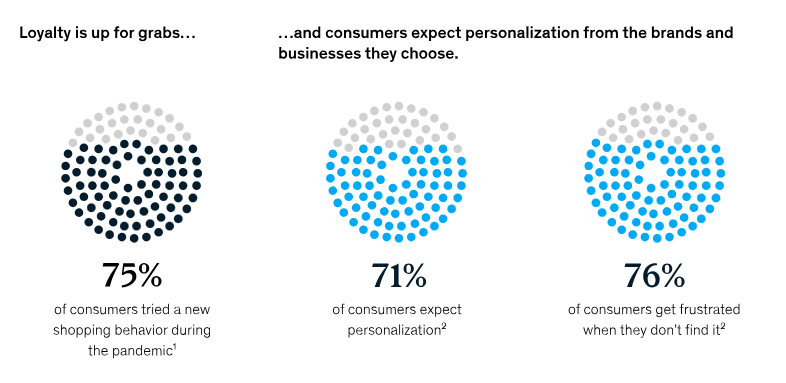
When marketers understand who they’re talking to, they can build stronger connections and deliver messages that truly resonate.
Designing Personalized Customer Journeys
Every customer’s path is unique, and Salesforce for marketers helps brands create journeys that feel personal from start to finish. With tools like Journey Builder and Engagement Studio, teams can build automated paths that respond to each user’s behavior.
Here’s how marketers are seeing results:
- Kirkpatrick Price used Salesforce’s Engagement Studio to automate nurture campaigns and generated $78,000 in new business during the COVID shift.
- Teams that integrate Data Cloud with Marketing Cloud have seen engagement lift by 165%, showing the impact of combining unified data with personalization.
- Conditional journey logic lets marketers show different content, offers, or follow-ups based on each person’s actions.
- Research from Epsilon shows 80% of consumers are more likely to buy when a brand offers personalized experiences.
With Salesforce, personalization becomes simple, scalable, and measurable, helping every interaction feel more human and timely.
Automating Omnichannel Campaigns
Modern marketing happens across multiple channels, and Salesforce for marketers helps you keep everything in sync. From email and SMS to web and social, Salesforce makes it easy to coordinate messages without constant manual effort.
Here’s how businesses are putting omnichannel automation to work:
- A credit union, Amplify, unified its messaging across email, mobile, and web using Marketing Cloud, achieving 1,079% ROI and full payback in just 16 weeks.
- Automated workflows allow marketers to coordinate emails, SMS messages, and push notifications all from one place.
- Triggered reminders, such as cart abandonment messages, can reach customers across multiple channels until they take action.
- Omnichannel automation helps teams deliver consistent, context-aware messages that match each customer’s stage and preferences.
By automating these journeys, marketers can stay connected with customers everywhere, without losing the personal touch.
Measuring ROI and Campaign Success
To improve your marketing, you need clear insights into what’s working. Salesforce for marketers gives teams the tools to track results across every channel and connect campaign performance directly to business outcomes.
Here’s how marketers measure impact in Salesforce:
- A Forrester TEI study found that Marketing Cloud users generated over $5 million in incremental revenue and improved site conversions by 60%.
- Teams track marketing ROI using simple formulas like (Revenue − Cost) / Cost, helping them see which campaigns deliver the best value.
- Dashboards in Salesforce show which touchpoints contributed most to a conversion or sale.
- Marketers gain visibility across channels, so they can adjust budgets and focus on the campaigns driving the strongest results.
With these insights, teams can move from guessing to knowing, making smarter decisions and proving the real value of their marketing.
Connecting Salesforce Across the Marketing Ecosystem
Marketing works best when every tool and team is connected. Salesforce for marketers makes this possible by bringing CRM, analytics, ads, and customer data into one platform. This helps you see the full picture, react faster, and create a consistent experience across every channel.
Integrating CRM and Marketing Cloud
Connecting Salesforce CRM with Marketing Cloud helps marketing and sales work as one. Both teams share the same data, so it’s easier to plan campaigns and follow up with the right leads.
Here’s how it helps:
- You can trigger campaigns automatically when a lead is created or updated in CRM.
- Customer details stay in sync across systems, keeping audience lists clean and accurate.
- Both teams see the full journey, from first touch to conversion, in one place.
This connection ensures that every message matches where a customer is in their buying process.
Linking Advertising, Analytics, and Social Tools
Reaching your audience across channels is easier when your data is connected. With Salesforce for marketers, you can link ads, analytics, and CRM to understand which efforts truly drive results.
Here’s how it adds value:
- Advertising Studio lets you target audiences on Google, Meta, and LinkedIn using CRM data.
- Connecting tools like Tableau or Google Analytics 4 shows how campaigns impact engagement and revenue.
- You can see which ads bring in the best leads and adjust budgets confidently.
This helps you focus on what works and improve performance with every campaign.
Syncing Real-Time Data Across Teams
Timing matters in marketing. Salesforce for marketers keeps everyone aligned with real-time data updates.
Here’s how it supports collaboration:
- It records customer actions instantly, helping you follow up when interest is highest.
- It keeps contact details and engagement scores current without manual effort.
- It helps teams coordinate outreach so customers get consistent, well-timed messages.
When data moves in real-time, marketing, sales, and service all stay in sync, creating smooth, connected experiences for every customer.
Skill Building for Marketers
To get real results from Salesforce for marketers, your team needs the right skills. Learning how to use Salesforce Marketing Cloud effectively helps marketers create smarter campaigns, personalize messages, and measure what matters.
Here’s how you can start building those skills:
- Begin with Trailhead: Salesforce’s free learning hub offers guided paths for marketers, covering topics like Journey Builder, Data Cloud, and campaign automation. It’s a hands-on way to learn at your own pace.
- Explore advanced courses: Platforms like LinkedIn Learning and Udemy offer structured training that walks through real campaign setups, integrations, and reporting.
- Pursue Salesforce certifications: Earning credentials such as Marketing Cloud Email Specialist or Marketing Cloud Consultant proves your expertise and helps teams apply best practices across every campaign.
- Keep skills current: Salesforce updates its tools regularly, so ongoing learning ensures your team stays ahead of new features and trends.
Teams that invest in Salesforce for marketers training see faster adoption, fewer errors, and better campaign outcomes, making skill-building a key part of long-term marketing success.
Getting Started with Salesforce for Marketing Teams
If you’re ready to explore Salesforce for marketers, the best place to start is by understanding your goals. Every business is different, so it’s important to match the platform’s features with what your marketing team needs most.
Here’s how to get started step by step:
- Evaluate your marketing needs: Begin with a quick audit of your current tools and workflows. Identify where you want to improve, such as lead nurturing, personalization, or reporting.
- Start small with clear use cases: Many teams begin by automating a few high-impact campaigns, like welcome emails or cart recovery journeys. This shows quick value before scaling further.
- Understand pricing and editions: Salesforce Marketing Cloud offers different editions with flexible pricing based on data volume, number of users, and modules like Data Cloud or Advertising Studio. Choose the one that aligns with your current marketing maturity.
- Request a demo or trial: You can book a personalized demo with Salesforce or an authorized partner to see how the platform fits your workflows.
- Work with an implementation partner: Certified partners can help set up integrations, migrate data, and train your team for faster adoption.
If email marketing is part of your plan, consider adding MassMailer, a native Salesforce app that extends Salesforce’s email capabilities. It’s built to work seamlessly within your CRM and helps you:
- Send unlimited emails directly from Salesforce without hitting standard limits.
- Create personalized email templates and track performance in real time.
- Manage contact lists, bounce data, and unsubscribes without leaving Salesforce.
- Automate drip campaigns, follow-ups, and reminders using familiar Salesforce workflows.
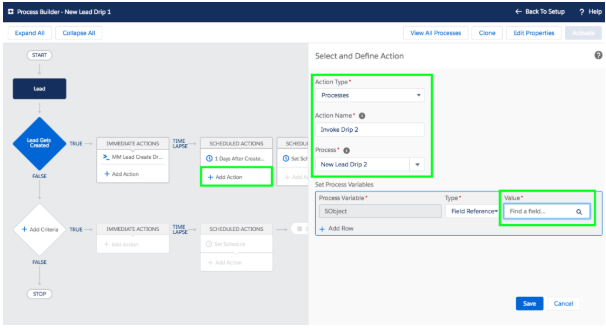
Getting started with Salesforce for marketers is less about jumping in all at once and more about building a strategy that fits your team. Start small, measure impact, and scale as you grow.
Conclusion
Salesforce for marketers helps you bring every part of your marketing together, from data and automation to personalization and results. It gives teams one place to plan, launch, and track campaigns that truly connect with customers.
With the right setup, Salesforce can help you reach the right audience, deliver meaningful experiences, and measure every outcome.
To make your email campaigns even stronger, try MassMailer, a native Salesforce app that lets you send bulk emails, track engagement, and manage campaigns directly within your CRM.
Now’s the time to simplify your marketing and scale your impact. Request a Salesforce demo or start with MassMailer to see how you can turn your marketing goals into real results.
Frequently Asked Questions
What’s the difference between Salesforce CRM and Salesforce Marketing Cloud?
How do marketers use Salesforce for audience segmentation?
How can marketers use Salesforce for omnichannel campaigns?
How does Einstein AI help marketers in Salesforce?
What are the best practices for using Salesforce for marketing campaigns?
Is Salesforce worth it for small or mid-size marketing teams?
Start Your Free Trial Today
Experience MassMailer the easiest way to send personalized emails from Salesforce.
Related Blogs
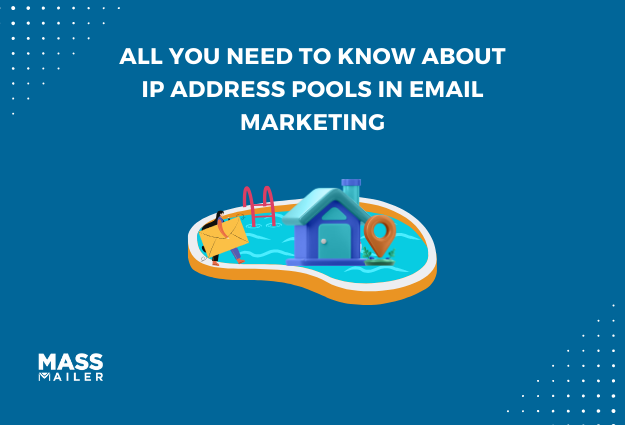
All You Need to Know About IP Address Pools in Email Marketing
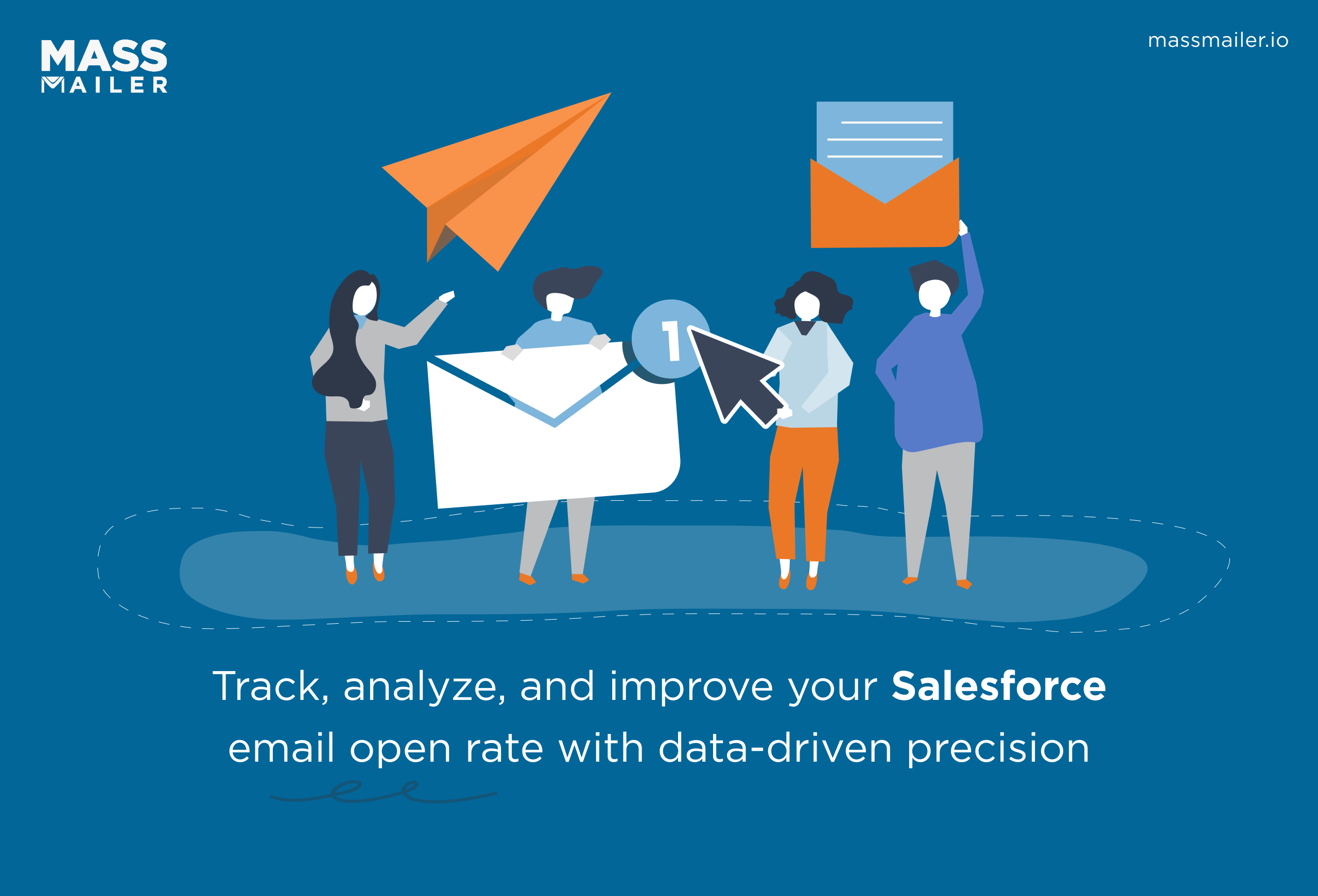
Salesforce Email Open Rate: How to Track and Improve
MassMailer Resources
MassMailer Glossary

